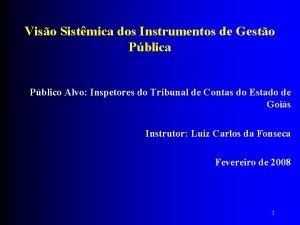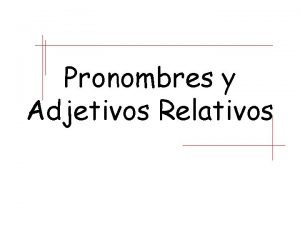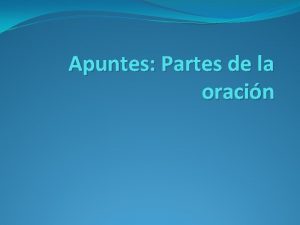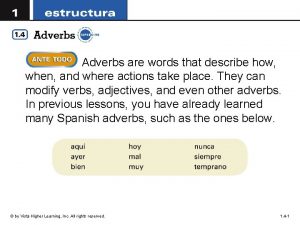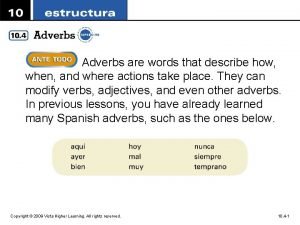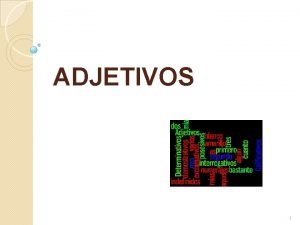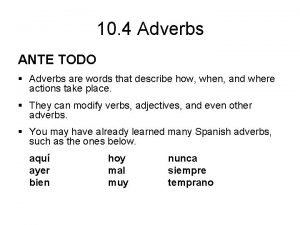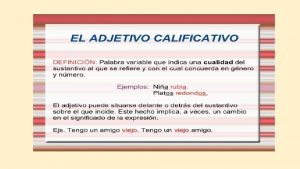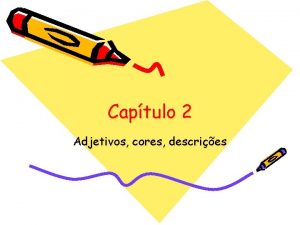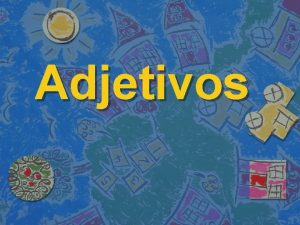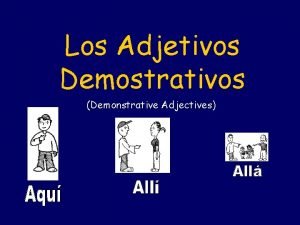Captulo 3 Los Adjetivos Los Adjetivos Are used












- Slides: 12

Capítulo 3 Los Adjetivos

Los Adjetivos • Are used to talk about what you and others are like. (They describe people and things. ) • In Spanish, most adjectives have both masculine and feminine forms.

Masculine Adjectives • Are used to describe masculine nouns. Ex. Marcos es alto y rubio. (Marcos is tall and blond. )

Feminine Adjectives • Are used to describe feminine nouns. Ex. Marta es simpática. (Marta is nice. )

Other Adjectives • Adjectives that end in –e describe both masculine and feminine nouns. Ex. Anita es inteligente. (Anita is intelligent/smart. ) Ex. Pedro es inteligente. (Pedro is intelligent/smart. )


The verb ‘ser’ • • • (Yo) soy: I am (Yo) no soy: I am not (Tú) eres: You are (Usted) es: You are (formal) (Él/Ella) es: He/She is (Nosotros/as) somos: We are (Vosotros) sois: You all are (Ustedes) son: You all are (Ellos/Ellas) son: They are This verb is used to describe someone or something. Ex. Laura es trabajadora. (Laura is hard-working. )

¡Vamos a practicar! • Translate the following sentences: 1. Susana is unpleasant. 2. Pablo is fat. 3. I am red-haired. 4. I am not old. 1. 2. 3. 4. Susana es antipática. Pablo es gordo. (Yo) soy pelirrojo/a. (Yo) no soy viejo/a.

¿Cómo es? • Fill in the blanks with the correct adjective. (joven, alta, bonita, guapo, antipático) guapo 1. Me gusta el muchacho. Él es muy _____. alta 2. Elena no es baja. Ella es ______. antipático 3. Él no es simpático. Es _______. 4. Mi amigo no es viejo. Es un chico muy _____. joven 5. Claudia no es fea. Es ______. bonita

Making Adjectives Plural Use the same rules that you learned when making nouns plural • If it ends in a vowel (a, e, i, o, u) add an ‘s’. • If it ends in a consonant (anything other than a vowel) add an ‘es’ • If it ends in a ‘z’, remove the z and add ‘ces’

¡Vamos a practicar! Make the following plural 1. importantes 2. rubias 3. tontos 4. jovenes 5. delgados 6. Feliz felices 7. trabajadores

¡Vamos a practicar! • Translate the following sentences: 1. The parents are interesting. 2. The relatives are tall. 3. The daughters are pretty. 4. The grandson and I are not thin. 1. 2. 3. 4. Los padres son interesantes. Los parientes son altos. Las hijas son bonitas. El nieto y yo no somos delgados.
 Mikael ferm
Mikael ferm Https://slidetodoc.com/captulo-2-o-sudeste-e-o-sul-do/
Https://slidetodoc.com/captulo-2-o-sudeste-e-o-sul-do/ Conceito de judaismo
Conceito de judaismo Pronombres demostrativos
Pronombres demostrativos In a premix burner used in fes the fuel used is
In a premix burner used in fes the fuel used is In a premix burner used in fes the fuel used is
In a premix burner used in fes the fuel used is Cuyo adjetivo relativo
Cuyo adjetivo relativo Adjetivos no descriptivos pronominales
Adjetivos no descriptivos pronominales 20 adjetivos de un gato
20 adjetivos de un gato Alegre adverb
Alegre adverb U adverbs
U adverbs El adjetivo se divide en
El adjetivo se divide en Inténtalo transforma los adjetivos en adverbios
Inténtalo transforma los adjetivos en adverbios

